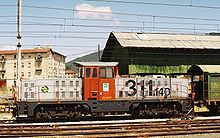Renfe Class 311
| RENFE 311 | |||||||||||||||||||||||
|---|---|---|---|---|---|---|---|---|---|---|---|---|---|---|---|---|---|---|---|---|---|---|---|
 RENFE 311.001 prototype (1986) | |||||||||||||||||||||||
| |||||||||||||||||||||||
| |||||||||||||||||||||||
| |||||||||||||||||||||||
| |||||||||||||||||||||||
The RENFE Class 311 is a class of four axle Bo'Bo' diesel electric shunting and light freight locomotives.
Background and design
The prototype locomotive 311.001 was designed by M.T.M. (Barcelona), Ateinsa (Madrid) and Babcock & Wilcox (Bilbao); the project was led by the Instituto Nacional de Industria.[note 1]
The prototype locomotive led to an order of 60 units, which were assigned to the subclass 311.1, and numbered 311.101 to 311.160.
The transmission system uses 4 axle hung pinion drive three-phase asynchronous motors powered by a three phase alternator driven by a MTU engine partly license built by Bazán. Siemens supplied Sibas-16 microprocessor engine control systems.[3]
The prototype locomotive was initially painted orange with a white stripe, the series production were all given a red/silver livery; standard for RENFE shunting locomotives. Some units have subsequently received a more recent white/grey renfe livery. As of 2010 most of the units are operated by RENFE Mercancías, about one third have been assigned to the infrastructure company Adif.[4]
Derivatives
The locomotives were a success for the Spanish engineering industry, and the design formed the basis of a number of locomotive types exported from the Meinfesa factory: the SBB Am 841 (40 units 1994), the GA DE900 locomotives for Mexico, Israel and Egypt (35 units, 1997-2000) and the SNCF Class BB 60000 (175 units, 2004-8).[5]
See also
- RENFE Class 309, and RENFE Class 310: contemporary shunting locomotives ordered a during the same period of modernisation of RENFE's shunter fleet.
Notes
- ^ The locomotives are sometimes known as Mabi from the initials of the companies involved in the design of the locomotive.
References

- ^ a b c d e f g h i j Jorge Sanz Mongay. "Serie 311". www.jorges.arrakis.es (in Spanish).
- ^ a b c d e f g "Caract. técnicas - Material motor - Renfe 311". www.listadotren.es (in Spanish).
- ^ "Las modernas locomotoras de maniobras de Renfe de la Serie 311". www.todotren.com.ar (in Spanish).
- ^ "ADIF - 311". www.listadotren.es (in Spanish).
- ^ "References Vossloh Rail Vehicles". www.vossloh-espana.com. Vossloh Rail Vehicles (Vossloh Espana). Shunting Locomotives.
Sources
- Arenillas Melendo, Justo : "La Traccion en los ferrocarriles españoles, Editorial Via Libre, Madrid, 2007
